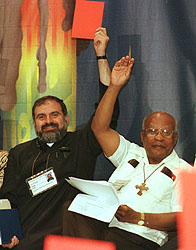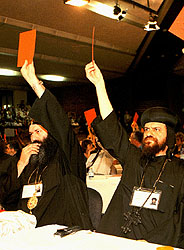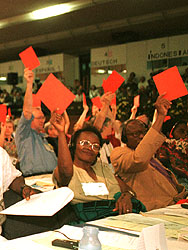Bishop Melvin Talbert of the United Methodist Church in the USA, moderator of the assembly's nominations committee, expressed regret that the committee was unable to meet its goal to increase the number of women on the central committee.
The final slate elected by the assembly included 39.4 percent women and 14.7 percent youth (persons under 30). An earlier slate rejected by the assembly had contained just 33 percent women and just under 14 percent youth.
Talbert told the assembly that the effort to prepare a slate that would reflect the various balances specified by the WCC's rules -- among women and men, lay and ordained persons, regions and countries, and church traditions -- had involved the nominations committee in long hours of work and sometimes painful negotiations. He thanked churches that had agreed to the committee's request to replace men with women or youth.
Complaints of under-representation were also voiced when the slate of presidential nominees showed six men and only two women. A delegate from Norway complained that the gains made ecumenically by women since the WCC's previous assembly in Canberra in 1991 "have been blown away". Nevertheless, the slate proposed by the nominating committee was elected.
The presidents of the WCC, elected by region, represent the interests of the churches in their areas to the WCC's central committee and are the chief interpreters of the work of the WCC in their regions. The new presidents:
- Africa: Agnes Abuom of the Anglican Church of Kenya
- Asia: Moon Kyu Kang of the Presbyterian Church in the Republic of Korea
- Europe: Chrysostomos of Ephesus, Ecumenical Patriarchate of Constantinople; Bishop Eberhardt Renz of the Evangelical Church in Germany
- Latin America and Caribbean: Federico J. Pagura of the Evangelical Methodist Church of Argentina
- Middle East: Mar Ignatius Zakka I Iwas of the Syrian Orthodox Church
- North America: Kathryn Bannister of the United Methodist Church in the USA
- Pacific: Jabez Bryce of the Anglican Church in Aotearoa/New Zealand and Polynesia
 Photo by Chris Black/WCC
Photo by Chris Black/WCCClick on the photo to order (ref. 7147-28)

Photo by Chris Black/WCC
Click on the photo to order (ref. 7146-18)

Photo by Chris Black/WCC
Click on the photo to order (ref. 7144-19a)
